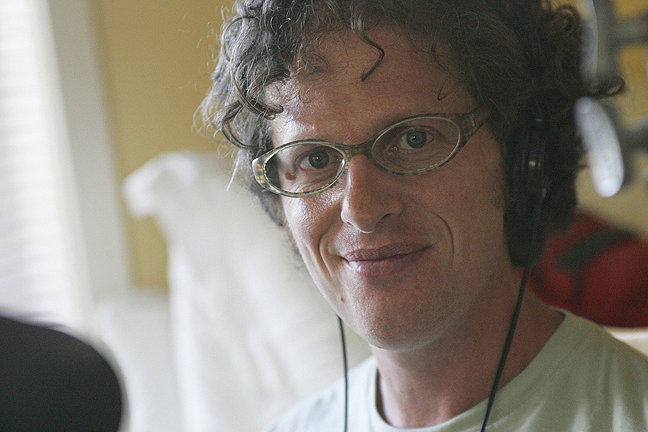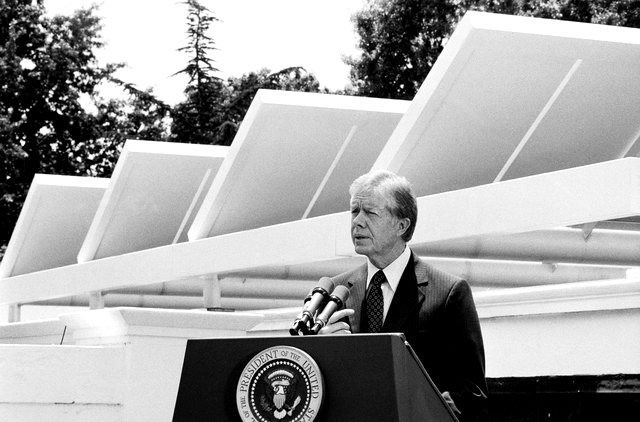Carbon Nation Director Peter Byck
November 5th, 2011
Podcast: Download (Duration: 36:00 — 28.9MB)
A Documentary About Energy Innovators and Climate Change Solutions
Winning a slew of praise and accolades since its release last fall, the movie Carbon Nation has been gaining attention and traction throughout 2011, and we are thrilled to have director Peter Byck on the program.
Big thanks to green energy and cleantech advocate Lee Barken for his help and assistance in making this edition of Treehuggers International possible, with additional thanks to the San Elijo campus of Mira Costa College in Encinitas, California.
Terrawatts and the Magic Number of 16
Carbon Nation takes an honest, often humorous look at global warming and the long-term effects of industrialization and fossil fuel use on our planet, and features success stories of private citizens, communities and organizations moving forward with alternative energy applications. If applied en masse, these alternative and renewable energy opportunities could meet – and surpass – the current, daily energy needs of the United States.
It wasn’t too long ago, during the heady days of 2006 following the release of Al Gore’s landmark global warming-awareness film An Inconvenient Truth, when pubic demand for government and private sector solutions to address not only our addiction to oil, but mankind’s cumulative, industrial effect on climate change was reaching a fever pitch. Political leaders from both parties began to call for remedies to global warming, as phrases like “cap and trade” and “carbon credits” began filtering into the lexicon.
By the late 2000s even GOP standard-bearers like Newt Gingrich, Mitt Romney and Jon Huntsman were proposing creative, free market-based ideas to encourage more responsible behavior by persistent industrial polluters. Sen. John McCain wisely stated in the early, pre-Sarah Palin stages of his 2008 candidacy:
“We have many advantages in the fight against global warming, but time is not one of them. Instead of idly debating the precise extent of global warming, or the precise timeline of global warming, we need to deal with the central facts of rising temperatures, rising waters, and all the endless troubles that global warming will bring. We stand warned by serious and credible scientists across the world that time is short and the dangers are great. The most relevant question now is whether our own government is equal to the challenge.”
Unfortunately, the intervening years have seen a complete lack of leadership on climate change issues from the White House and Congress, coupled with a bizarre, frequently anti-science backlash from entrenched energy and oil interests and their congressional and media allies. Over time, the absence of a strong voice on climate change, the recession, and the science-defying drumbeat from the political right has eroded the upswell of public support for addressing global warming and exploring renewable energy options.
While Europe and the rest of the western world have begun to plan for the consequences of climate change and taken steps to reduce their carbon footprint, the U.S. has remained notoriously idle. In the current House of Representatives, congressional minions of the Koch Brothers and other big energy industries have been actively working to gut functional environmental regulation and oversight which has made significant strides over the last 40 years in ensuring the cleanliness of U.S. air and water.
Green Energy Grassroots Efforts and Applications
While the U.S. government has so far failed to take a strong lead on the green front, and sometimes works against the best interests of the nation’s environmental health, cities and communities, citizens’ groups and green energy innovators haven’t been waiting for anyone to tell them “go.” The business of making the world a cleaner, healthier, more energy-efficient place is right at home in the U.S. with abundant innovation, complimented by some federal and state tax breaks available for green outlets.
Among the many fascinating characters we meet in Carbon Nation, one is Texas farmer Cliff Etheridge, who currently counts wind as one of his “crops.” As the owner of Peak Wind, one of the world’s largest wind farm outlets, Cliff had seen how other energy companies were leasing his neighbors’ land to develop wind farms. Instead of leasing his own land, he opted to utilize hundreds of acres of his own farmland to build a wind farm business, with dozens of giant windmills taking him off the grid and creating a functional, lucrative business for himself, his son, and others from his west Texas hometown in need of jobs.
Peter Byck also spends time with Alaska geothermal pioneer Bernie Karl in Carbon Nation, and the good news with geothermal is you no longer have to be sitting atop a geyser or volcanic field to tap into the earth’s energy. Bernie invented a way to use water heated to only 165 degrees to create geothermal power; previously water had to be at least 250 degrees, and more realistically, had to be on the way to 400 degrees to be effective. With this new geothermal innovation, it’s now possible to draw hot water from the earth’s crust nearly anywhere, even in the middle of Manhattan, and utilize the power of the planet for electricity and energy needs.
One face in Carbon Nation may be already familiar to some. Van Jones is the author of Green Collar Economy and the former Special Advisor for Green Jobs, Enterprise and Innovation at the White House Council on Environmental Quality under President Obama. Van was also the primary advocate for the Green Jobs Act, signed into law by President Bush in 2007, and notable for being the first federal legislation to utilize the term “green jobs.” In Carbon Nation, Van takes the filmmakers to a Solar Richmond and Grid Alternatives project site in the Bay Area, as employees and trainees work to make pre-exisiting structures as energy efficient as possible, and in doing so, help create a green energy industry and workforce with real-world applications.
Peter Byck also introduces Carbon Nation viewers to retired U.S. Army Col. Dan Nolan, and former CIA Director R. James Woolsey, both are members of the growing number of “Green Hawks” in the U.S. military and national security agencies. Led by policy makers, intelligence professionals, and hardened veterans of the Iraq and Afghanistan wars, the Green Hawks have become a formidable voice within the military, leading the Pentagon towards energy efficiency to make overseas operations less costly and more effective, and to make supply lines and energy independence for overseas missions less vulnerable.
More about this post at:
- Carbon Nation
- Mid-American Project to Include 176 New Wind Turbines (Omaha World-Herald; 1/7/12)
- Hawaii Inches Toward 100% Renewable Energy With Geothermal (Honolulu Star-Advertiser; 1/6/12)
- Solar Panels Compete With Cheap Natural Gas (NPR; 1/5/12)
- A Youngster’s Bright Idea Is Something New Under the Sun (Wall Street Journal; 1/5/12)
- Deficit Hawks Want Green Efforts to Fail (Florida Today; 12/30/11)
- Van Jones and the American Dream Movement (Politico; 11/26/11)
- Flathead Electric Co-op to Start Drilling Geothermal Well (The Missoulian; 11/14/11)
- Pentagon “Green Hawks” See Energy Security In Biofuel (Christian Science Monitor; 10/10/11)
- Carbon Nation Director Peter Byck (SoCal.com; 10/1/11)
- A Film About Climate Change Even Skeptics Can Love (Bluegrass and Beyond; 6/6/11)
- Carbon Nation (Beyond Chronicle; 3/11/11)
- Carbon Nation Lesson: A Green Economy Is A Labor Economy (The Village Voice; 2/9/11)
- Peter Byck and Carbon Nation (Filmmaker; 2/9/11)
- The Green Hawks Are Coming (The Tyee; 12/20/10)
- Peter Byck’s Carbon Nation Features Creative Energy Solutions (Bloomberg; 4/21/10)
- The New Green Land Rush (CNN Money; 2/18/10)
- New Cleantech Rule Clarifies Climate Change Disclosure Requirements (SDNN; 2/3/10)
- China Racing Ahead of the U.S. In the Drive to Go Solar (New York Times; 8/24/09)
- Gene Scientist to Create Algae Biofuel With Exxon Mobil (The Guardian; 7/14/09)
- Harnessing the Sun With Help from Cities (New York Times; 3/15/09)
- Is Algae the Biofuel of the Future? (Science Daily; 8/18/08)








